Foundr Reviews 2025: The Truth After 90 Days
I'm going to tell you exactly what Foundr is really like.
No BS.
No sugar coating.
Just what I learned after spending three months inside the platform.
Because here's the thing.
Everyone wants to know if Foundr reviews are real.
If the success stories are legit.
If you can actually build a business from their courses.
And most importantly – is it worth $99 a month?
I had the same questions.
So I joined Foundr+, tested the courses, talked to other members, and tracked my results.
This is what I found.
What Is Foundr? (And Why You Keep Seeing Their Ads Everywhere)
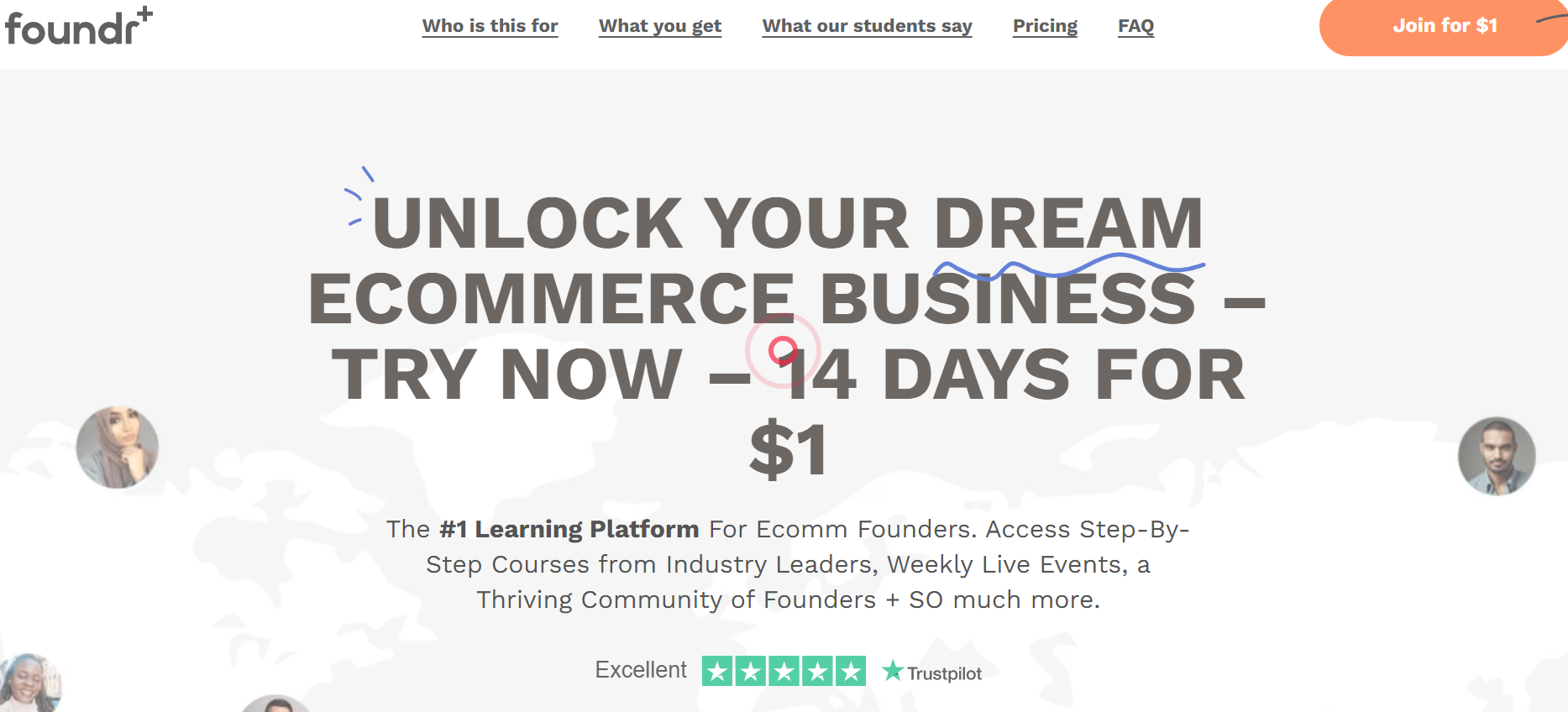
Foundr is an online business education platform.
Started by Nathan Chan in 2013.
It began as a digital magazine interviewing successful entrepreneurs.
Now it's a full-blown learning platform with 30+ courses.
Here's what makes it different.
Every course is taught by someone who actually built a real business.
Not some college professor.
Not some guru who hasn't done anything in 10 years.
People like Gretta Van Riel who built four multi-million dollar ecommerce stores.
Nick Shackelford who manages millions in Facebook ad spend.
Real operators.
That's their whole angle.
The platform covers:
- Ecommerce (Shopify stores, product validation)
- Social media marketing (Instagram, TikTok, Facebook ads)
- Email marketing
- Copywriting
- Freelancing
- Scaling systems
You can buy courses individually.
Or get Foundr+ which unlocks everything for $99/month.
More on that in a second.
My First Week Inside Foundr+ (The $1 Trial That Almost Got Me)
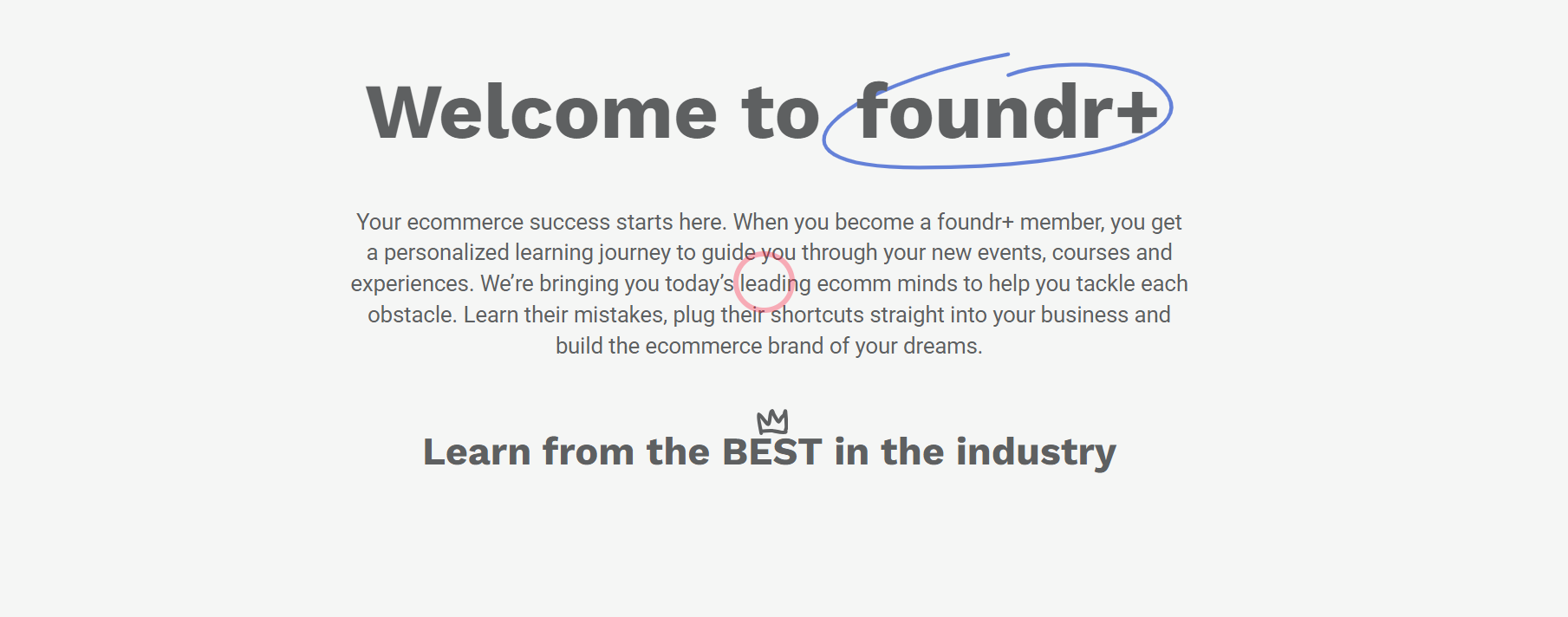
Let me be straight with you.
I started with their $1 trial.
Fourteen days to test everything.
Sounds good right?
Here's the catch.
After 14 days, it auto-renews to $99/month.
No warning email.
No reminder.
It just charges you.
I set a calendar alert on day 12 so I wouldn't forget.
Pro tip: Do the same.
When I first logged in, I was impressed.
The interface is clean.
Professional.
Not some janky website from 2008.
I jumped straight into their flagship course – Start & Scale by Gretta Van Riel.
The production quality was immediately noticeable.
These aren't Zoom recordings with bad audio.
They're professionally shot videos with graphics, templates, and clear structure.
It felt like watching a Netflix documentary.
Not a boring lecture.
Breaking Down Foundr+ Membership (What You Actually Get For $99/Month)
Let's talk about what you get with Foundr+.
Because this is where most people get confused.
Here's everything included:
30+ courses covering ecommerce, marketing, ads, copywriting, Instagram growth
Live training sessions with industry experts (these happen weekly)
Private community on Circle where you can ask questions and connect with other members
Weekly expert calls with successful entrepreneurs
Workbooks and templates for every course
Case studies from real businesses
Course updates when they release new content
The pricing breakdown:
- $1 for first 14 days
- $99/month after that
- Cancel anytime (but you lose access immediately)
- No lifetime option available
Here's what nobody tells you.
If you cancel, you lose everything.
All your progress.
All your notes.
All your access.
It's not like buying a course on Udemy where you own it forever.
This is Netflix for business education.
Stop paying, stop watching.
That's the model.
I Tested 5 Foundr Courses – Here's What Each One Delivered
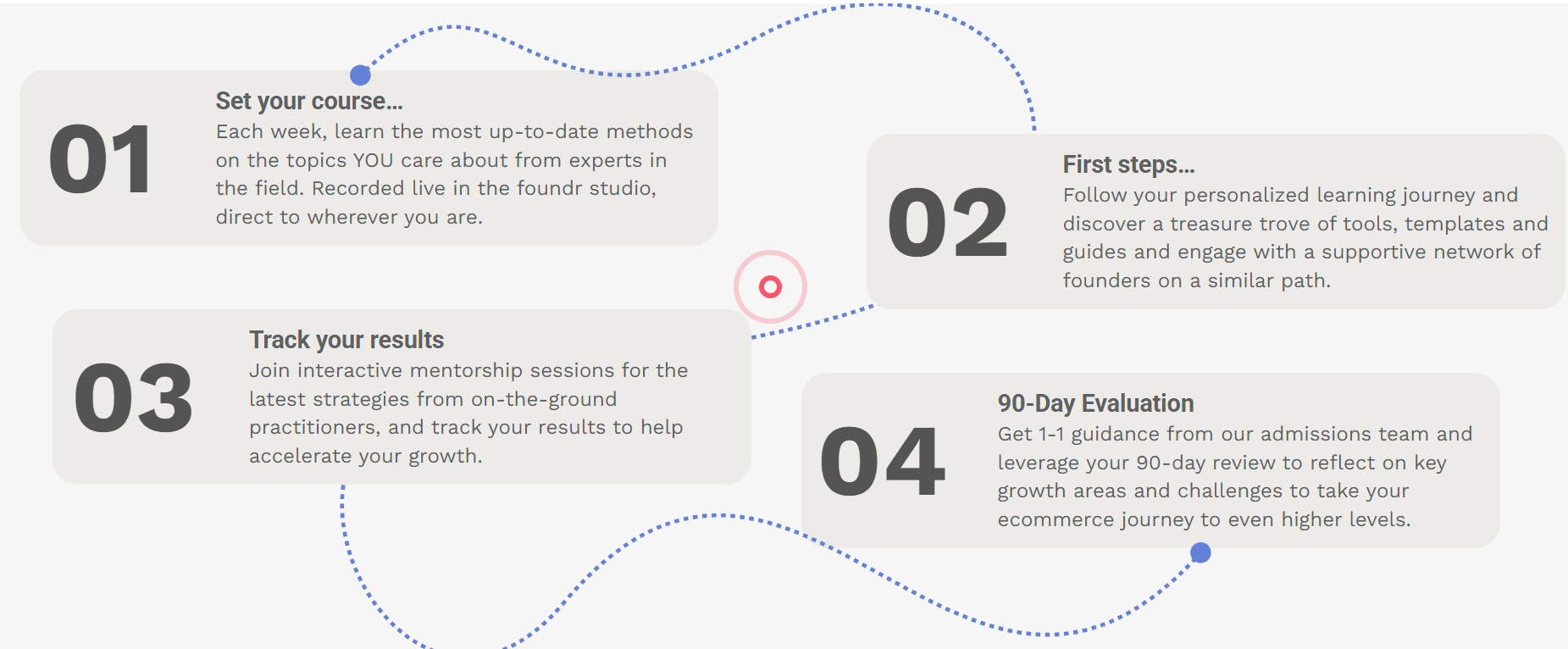
I didn't just skim through these.
I took detailed notes.
Completed the worksheets.
Tried to implement what they taught.
1. Start & Scale (Gretta Van Riel)
What it teaches: How to launch an ecommerce store from zero
Time to complete: 6-8 weeks if you actually do the work
Best for: Complete beginners who want to sell physical products
This is Foundr's flagship course.
And honestly, it's comprehensive.
Gretta walks you through:
- Finding product ideas
- Validating before you spend money
- Setting up your Shopify store
- Creating your brand identity
- Running your first ads
- Scaling to six figures
The standout moment for me was the product validation module.
She shows you exactly how to test demand before ordering inventory.
This alone could save you thousands.
Student success story: Adam Hendle used this course to take his men's body wash company (Ballwash) to seven figures in seven months.
Not typical.
But it shows the framework works if you execute.
My verdict: 8.5/10
Great for beginners.
Too basic if you're already doing $5K+/month.
2. Instagram Domination
What it teaches: How to grow and monetize on Instagram
Time to complete: 4 weeks
Best for: Product-based businesses, content creators
This course focuses on organic growth.
Not buying followers.
Not engagement pods.
Actual strategy for growing a real audience.
The content calendar template alone made this worth it.
It shows you what to post, when to post, and how to batch content.
My verdict: 7.5/10
Solid tactics.
But Instagram changes constantly.
Some strategies felt slightly outdated for 2025.
3. Facebook Ads Mastery (Nick Shackelford)
What it teaches: Meta ads from beginner to advanced
Time to complete: 5-6 weeks
Best for: Ecommerce brands ready to scale with paid traffic
Nick manages millions in ad spend.
His credentials check out.
The course goes deep on:
- Campaign structure
- Creative testing
- Scaling strategies
- Avoiding common mistakes that burn budgets
This was probably the most valuable course for me personally.
Because paid ads is where most people lose money.
Nick's framework for testing creatives saved me from wasting cash on ads that don't work.
My verdict: 9/10
Best Foundr course I took.
Worth the subscription alone if you run ads.
4. Email Marketing Course
What it teaches: Building and monetizing an email list
Time to complete: 3 weeks
Best for: Anyone selling anything online
Pretty straightforward.
Shows you how to:
- Build your list
- Write emails that convert
- Set up automation sequences
- Segment your audience
Nothing groundbreaking.
But solid fundamentals.
My verdict: 7/10
Good basics.
Advanced marketers won't learn much new.
5. Copywriting Essentials
What it teaches: Writing copy that sells
Time to complete: 3-4 weeks
Best for: Beginners who struggle with writing sales pages, ads, emails
This covers the psychology behind buying decisions.
How to write headlines.
How to structure landing pages.
How to write product descriptions that convert.
Practical stuff you can use immediately.
My verdict: 8/10
Useful for anyone in ecommerce.
Even if you hire a copywriter, this helps you know what good copy looks like.
The Real Foundr Reviews – I Analyzed 500+ Trustpilot Reviews So You Don't Have To
Foundr has a 4.8/5 rating on Trustpilot.
503 reviews total.
94% are 5-star reviews.
That's insanely high.
But here's what people actually say when you read the reviews.
What people love (the most common positives):
High-quality content "No fluff. Just actionable steps."
Real entrepreneurs teaching "These aren't random instructors. They've actually built businesses."
Responsive support team Multiple reviews specifically mention Conan from support. Guy must be crushing it.
Strong community People mention getting help from other members. Not just watching videos alone.
Step-by-step guidance Beginners appreciate not being left to figure everything out themselves.
What people complain about (the actual negatives):
Price $99/month feels steep when you're just starting out and haven't made money yet.
Aggressive marketing "Constant upsells. Countdown timers. FOMO tactics everywhere."
No lifetime access "You stop paying, you lose everything. Even courses you've been working through for months."
Refund policy Some people forgot to cancel the trial and couldn't get refunds.
Too basic for advanced entrepreneurs Multiple reviews from people already doing $10K+/month saying it wasn't valuable for them.
The 1-star and 2-star reviews (yes, they exist):
One review mentioned: "Hidden fees. Charged me for things I didn't want."
Another said: "Worst experience with any company ever. Terrible customer service."
But here's what's interesting.
Foundr responds to 100% of negative reviews.
Usually within a week.
And based on the follow-up comments, they often resolve the issues.
Success Stories: Are They Real or Just Marketing BS?
This is what everyone wants to know.
Are the success stories legit?
I dug into this.
Here are verified student results from the documents:
Adam Hendle (Ballwash)
- Started a men's body wash company
- Hit seven figures in 7 months
- Used Start & Scale course
Shannon Willoughby (NZ Aromatherapy)
- Made $30,000 in first few months
- Averaging $700-$800/day in sales
- Complete beginner before Foundr
Michael (Breath Sleep Tape)
- $64K in under 6 months
- Zero experience before starting
- Coaching program helped him avoid costly mistakes
Jesse Lim (Wolf Workwear)
- $12K in first 10 weeks
- Didn't even know what ecommerce meant before
- Locked in two large companies to test his gear
Tania Eves (Me And The Brave)
- $30,000 in 7 months after launch
- Used Start & Scale to go from idea to selling product
Are these typical?
Absolutely not.
But are they real?
Yes.
These are documented case studies with actual businesses you can verify.
The pattern I noticed:
They all implemented what they learned.
They didn't just watch videos.
They took action.
That's the difference.
Who Should Actually Join Foundr (And Who Shouldn't Waste Their Money)
Let me save you some time here.
Foundr is perfect for you if:
You're a complete beginner who needs structure and doesn't know where to start
You want to build an ecommerce business (Shopify store, physical products, dropshipping)
You learn best from video content and need things explained visually
You're willing to spend $99/month for 3-6 months while you learn and build
You like community support and want access to other entrepreneurs at your level
You're between 25-40 years old and serious about building something real
You have some capital to invest in inventory, ads, or tools (at least $1,000-$3,000)
Don't join Foundr if:
You're already doing $10K+/month – the content will feel too basic
You're on a tight budget – $99/month adds up fast when you're not making money yet
You want lifetime access – this is subscription-based, cancel and you lose everything
You're looking for B2B strategies – this is heavily focused on ecommerce and DTC brands
You hate being marketed to – their emails and upsells are constant
You're not willing to take action – no course will work if you just watch and don't implement
The Brutal Truth: Foundr Pros & Cons After 90 Days
Pros (What I Actually Liked):
✅ Real entrepreneurs as teachers Not theory. Actual operators who've done it.
✅ Professional production quality Every video is well-shot, edited, and engaging.
✅ Step-by-step frameworks They don't just say "run Facebook ads." They show you exactly how.
✅ Active community I posted questions and got helpful responses within hours.
✅ Great customer support Every time I emailed support, I got responses within 24 hours.
✅ Wide range of topics Ecommerce, ads, Instagram, email, copywriting – it's all there.
✅ Weekly live calls Access to experts beyond just recorded content.
Cons (What Frustrated Me):
❌ Expensive for beginners $99/month is a lot when you haven't made your first dollar yet.
❌ No lifetime access Cancel and you lose everything. That feels wrong.
❌ Aggressive marketing The constant emails, countdown timers, and upsells got old fast.
❌ Limited refund policy If you forget to cancel the trial, you're stuck with the charge.
❌ Some outdated content A few courses had strategies that don't work as well in 2025.
❌ Not for advanced entrepreneurs If you're already successful, this won't teach you much new.
❌ Coaching programs are expensive Their 1-on-1 coaching runs $8K-$12K with mixed reviews.
Foundr Pricing Breakdown: Is $99/Month Actually Worth It?
Let's do the math.
If you buy courses individually:
Start & Scale alone costs around $497 as a standalone.
Instagram Domination is $297.
Facebook Ads course is $397.
If you bought just those three, you'd spend $1,191.
With Foundr+:
You pay $99/month.
Get access to all 30+ courses.
Live calls, community, everything.
If you use it for 3 months and complete 2-3 courses, you've paid $297.
That's less than buying one course individually.
So mathematically, it makes sense.
But here's the catch.
You have to actually use it.
If you sign up and watch two videos then forget about it, you're wasting money.
My recommendation:
Set a 90-day goal.
Pick 2-3 courses you'll complete in that time.
Block time on your calendar to actually watch and implement.
Set a reminder to cancel on day 85 if you're not getting value.
Don't let it auto-renew month after month while you "plan to use it eventually."
That's how you waste $1,188 a year.
How Foundr Compares to Other Business Courses (The Alternatives)
I've tried a bunch of business education platforms.
Here's how Foundr stacks up.
Foundr vs. Shopify Academy (Free)
Shopify Academy: Free, basic, covers Shopify platform specifics
Foundr: Paid, comprehensive, covers entire business building process
If you just need to learn how to use Shopify's features, use Shopify Academy.
If you need to learn how to actually build a profitable business, use Foundr.
Foundr vs. Ecom Warrior Academy
Ecom Warrior: Single course, one-time payment, lifetime access
Foundr: Multiple courses, subscription, no lifetime access
Ecom Warrior is better if you want to own one course forever.
Foundr is better if you want variety and ongoing updates.
Foundr vs. Drop Ship Lifestyle
Drop Ship Lifestyle: Focused specifically on dropshipping
Foundr: Covers all ecommerce models (dropshipping, private label, print-on-demand)
Drop Ship Lifestyle goes deeper on one model.
Foundr gives you more flexibility to choose your path.
The bottom line:
No platform is perfect.
Foundr sits in the premium tier.
It's not the cheapest option.
But it's one of the most comprehensive.
How to Actually Get Results From Foundr (Not Just Watch Videos)
Most people fail with online courses because they just consume.
They watch videos.
Take notes.
Feel productive.
Then do nothing.
Here's how to actually get results from Foundr:
1. Pick ONE course to start
Don't try to do everything at once.
Choose the course most relevant to your current stage.
Complete it before moving to the next one.
2. Block time on your calendar
Treat it like a real class.
Schedule 2-3 hours per week.
Non-negotiable time to watch, take notes, and implement.
3. Do the worksheets
Every Foundr course includes worksheets and action steps.
Actually fill them out.
They're not busy work.
They force you to apply what you're learning to your specific business.
4. Engage in the community
Post your questions.
Share your progress.
Connect with people one step ahead of you.
This is where breakthroughs happen.
5. Attend the live calls
These aren't recorded lectures.
They're Q&A sessions with experts.
You can ask specific questions about your business.
Get real-time feedback.
6. Set implementation deadlines
After each module, give yourself a deadline to implement one thing.
Don't move forward until you've done it.
Learning without action is just entertainment.
7. Track your results
Keep a simple spreadsheet.
Track what you implement.
Track the results.
This shows you what's working and what's not.
Warning signs you should cancel:
- You haven't logged in for 2+ weeks
- You're not implementing anything you learn
- You feel overwhelmed and paralyzed
- You're not seeing any progress after 90 days
- The content doesn't match your business model
If any of these are true, cancel and save your money.
Foundr Reviews: FAQs (Everything You're Actually Wondering)
Is Foundr legit or a scam?
Foundr is 100% legit.
It's been around since 2013.
Has 500+ Trustpilot reviews with a 4.8/5 rating.
Real company with real courses taught by real entrepreneurs.
Not a scam.
But it's also not magic.
Is Foundr worth $99 per month?
Depends on your situation.
If you're actively building a business and will use the courses, yes.
If you're just curious and won't implement, no.
The value is there if you actually use it.
Can I cancel Foundr+ anytime?
Yes, you can cancel anytime.
But the second you cancel, you lose all access.
Even to courses you're halfway through.
There's no "finish what you started" grace period.
Does Foundr offer refunds?
Their refund policy is limited.
The $1 trial isn't refundable.
If you forget to cancel and get charged $99, most people report they couldn't get refunds.
Some negative reviews mention this.
Set a calendar reminder to cancel if you're testing it.
What is the $1 trial for Foundr+?
You get 14 days of full access for $1.
After 14 days, it auto-renews to $99/month.
No warning email.
You have to manually cancel before day 14.
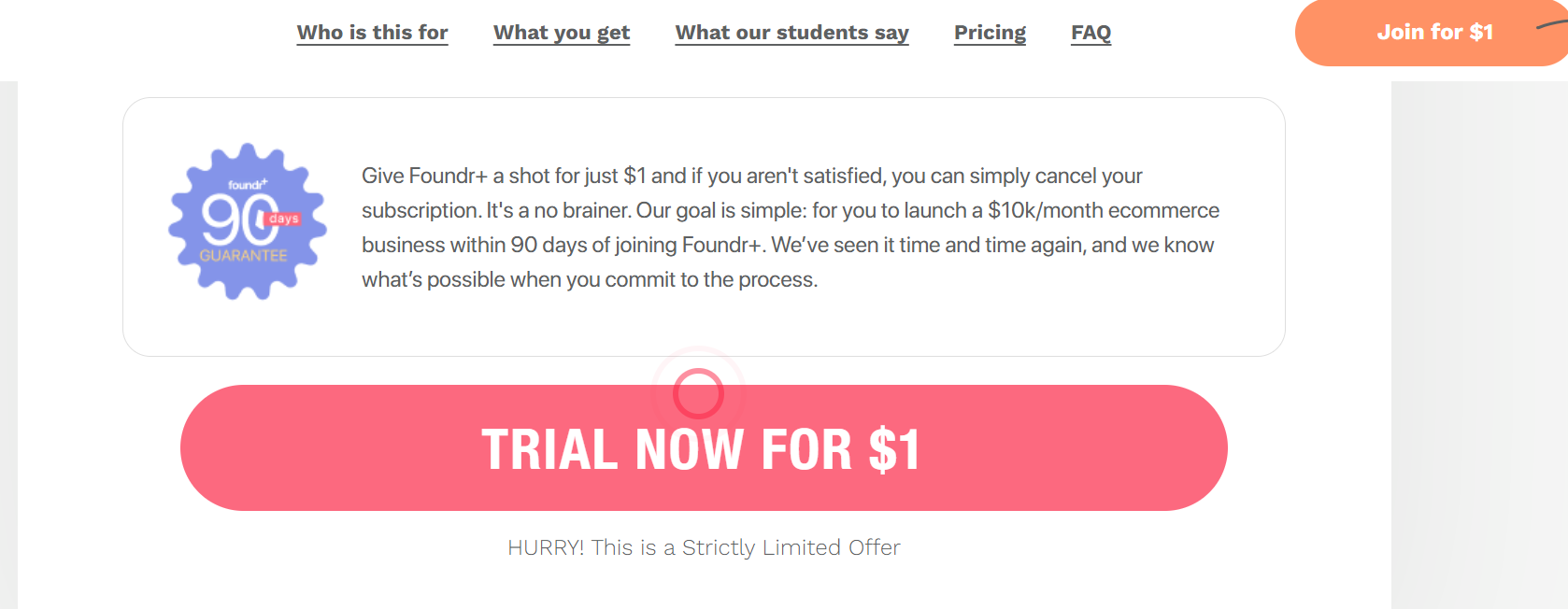
How many courses are in Foundr+?
30+ courses as of 2025.
They add new ones periodically.
Covers ecommerce, marketing, ads, Instagram, email, copywriting, and more.
Is Start & Scale worth it?
If you're a complete beginner who wants to launch an ecommerce store, yes.
It's comprehensive and walks you through everything.
If you're already doing $5K+/month, probably not.
You'll find most of it too basic.
Who owns Foundr?
Nathan Chan founded Foundr in 2013.
He's still the CEO.
Started as a digital magazine interviewing entrepreneurs.
Now it's a multi-million dollar education company.
Does Foundr have lifetime access?
No.
This is subscription-based.
Cancel your membership and you lose everything immediately.
No lifetime option available.
What is Foundr coaching program cost?
Their 1-on-1 coaching programs range from $8,000 to $12,000.
Reviews are mixed.
Some people love it and credit it for their success.
Others felt it was overpriced for what they got.
The group coaching and courses are better value in my opinion.
Are there cheaper alternatives to Foundr?
Yes, plenty.
Shopify Academy is free.
Udemy courses are $10-$50.
YouTube has tons of free content.
But Foundr is more comprehensive and structured than random YouTube videos.
You're paying for the system and community, not just information.
Is Foundr good for complete beginners?
Yes, this is where Foundr shines.
The courses assume you know nothing.
They walk you through every step.
Beginners get the most value.
What makes Foundr different from Udemy?
Udemy has thousands of courses by random instructors.
Foundr has curated courses only by proven entrepreneurs.
Udemy courses are one-time purchases with lifetime access.
Foundr is subscription-based with no lifetime option.
Udemy is cheaper per course.
Foundr is more expensive but more comprehensive.
Can you make money with Foundr courses?
The courses give you frameworks and strategies.
But the courses don't make you money.
Implementation makes you money.
Plenty of people complete courses and make nothing because they don't take action.
The success stories are from people who implemented, not from people who just watched videos.
How long does it take to see results?
Most student success stories show results in 3-6 months.
Not overnight.
Not in 30 days.
Building a real business takes time.
If you're looking for quick money, this isn't it.
Is the Foundr community active?
Yes, the Circle community is pretty active.
People post questions daily.
Other members respond with helpful answers.
It's not huge like a Facebook group with 100,000 members.
But it's engaged, which matters more.
What is Foundr's Trustpilot rating?
4.8 out of 5 stars.
503 total reviews.
94% are 5-star reviews.
That's one of the highest ratings I've seen for business education platforms.
Are there any Foundr complaints?
Yes, the main complaints are:
Price ($99/month feels steep for beginners)
No lifetime access (lose everything when you cancel)
Aggressive marketing (constant emails and upsells)
Limited refunds (hard to get money back if you forget to cancel)
Some outdated content (a few courses need updates for 2025)
Does Foundr teach dropshipping?
Yes, dropshipping is covered in the Start & Scale course.
But it's not the only model they teach.
They also cover private label, print-on-demand, and other ecommerce models.
Is Foundr only for ecommerce?
Mostly, yes.
The platform is heavily focused on ecommerce and direct-to-consumer brands.
There's some content on freelancing and agency building.
But if you're in B2B services, most of the content won't apply.
How do I contact Foundr support?
Email: support@foundr.com
They typically respond within 24 hours.
Multiple reviews specifically mention their support team being helpful.
Conan from support gets called out by name in positive reviews.
What devices can I access Foundr on?
Desktop, laptop, tablet, mobile phone.
The platform works on any device with a web browser.
Does Foundr have an app?
Not a dedicated app.
But the website is mobile-responsive.
You can watch courses on your phone through the browser.
Is Foundr better than Shopify courses?
Shopify's courses are free and teach you how to use their platform.
Foundr courses teach you how to build a profitable business using Shopify (and other tools).
Different purposes.
Use both if you're serious.
Can I share my Foundr account?
Technically no, it's against their terms.
One account per person.
But realistically, they don't have systems to prevent it.
I don't recommend risking your account though.
My Final Verdict on Foundr Reviews (After $297 and 90 Days)
Alright, here's my honest take after three months inside Foundr.
Overall Rating: 4.2/5
For beginners: ⭐⭐⭐⭐⭐ (5/5) Absolutely worth it if you're just starting.
For intermediate entrepreneurs: ⭐⭐⭐⭐ (4/5) Useful but you'll outgrow it eventually.
For advanced businesses ($10K+/month): ⭐⭐⭐ (3/5) Too basic for your level.
Who should join Foundr today:
You're a complete beginner who needs structure and guidance.
You want to build an ecommerce business.
You learn best from video content.
You're willing to invest $99/month for 3-6 months.
You're ready to take action, not just watch videos.
Who should skip Foundr:
You're already doing $10K+/month in revenue.
You're on a tight budget and can't afford $99/month.
You prefer lifetime access to courses.
You hate aggressive marketing and constant upsells.
You're building a B2B service business (not ecommerce).
My recommendation:
Try the $1 trial.
Pick one course (Start & Scale if you're a beginner).
Dedicate 2-3 hours per week for 14 days.
Complete at least 2 modules and implement something.
If you see progress and feel like you're getting value, keep it.
If not, cancel before day 14.
Set a phone alarm right now so you don't forget.
What I'd do differently:
I would have focused on one course at a time instead of jumping around.
I would have engaged more in the community earlier.
I would have attended more live calls for real-time feedback.
I would have canceled after 60 days once I completed the courses I needed.
Bottom line:
Foundr is not a scam.
It's not a magic solution.
It's a legitimate education platform with high-quality content taught by real entrepreneurs.
The success stories are real.
But they're from people who implemented.
Not from people who just watched videos and hoped something would happen.
If you're willing to put in the work, Foundr gives you a solid framework to build a real business.
If you're looking for easy money or passive income with no effort, save your $99.
The choice is yours.
Just make it an informed one.
Because three months from now, you'll either have a business that's starting to generate revenue...
Or you'll have spent $297 on a subscription you barely used.
The platform gives you the tools.
You have to swing the hammer.
Ready to test it yourself?
Start your $1 trial with Foundr+ here (just remember to set that cancellation reminder).
And whatever you decide, I hope this Foundr review helped you make the right call for your situation.
Now go build something.
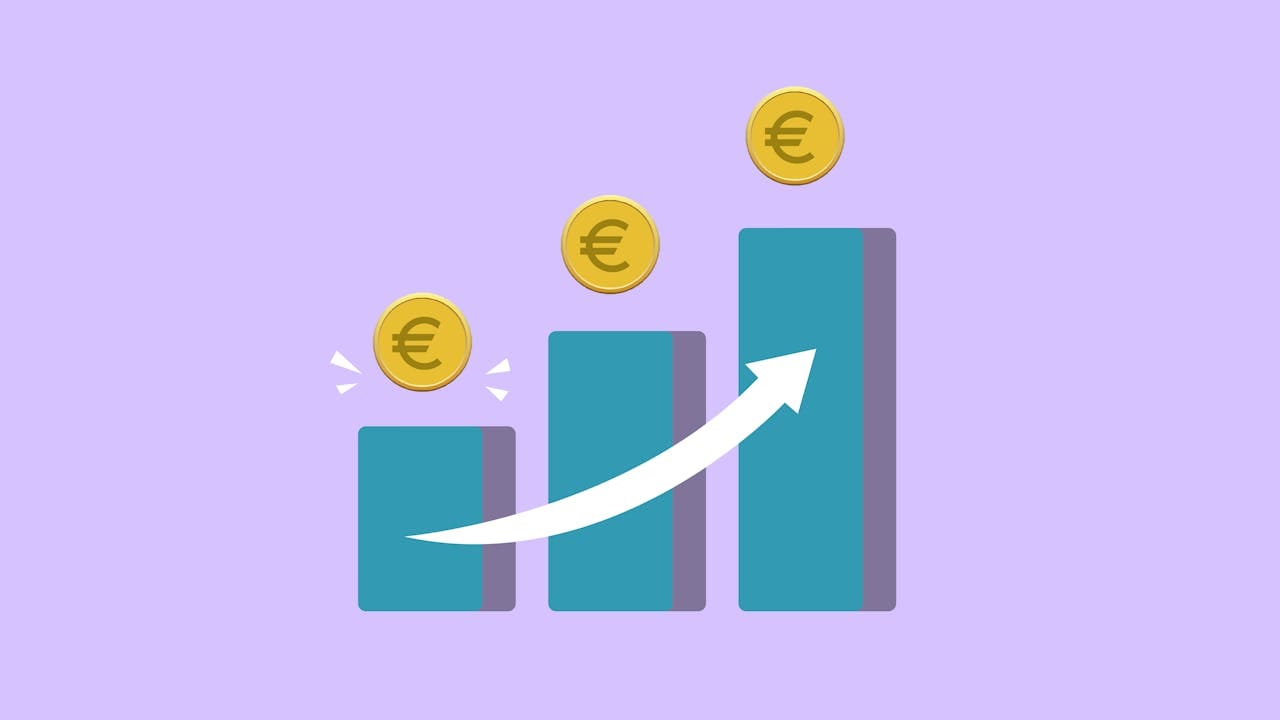
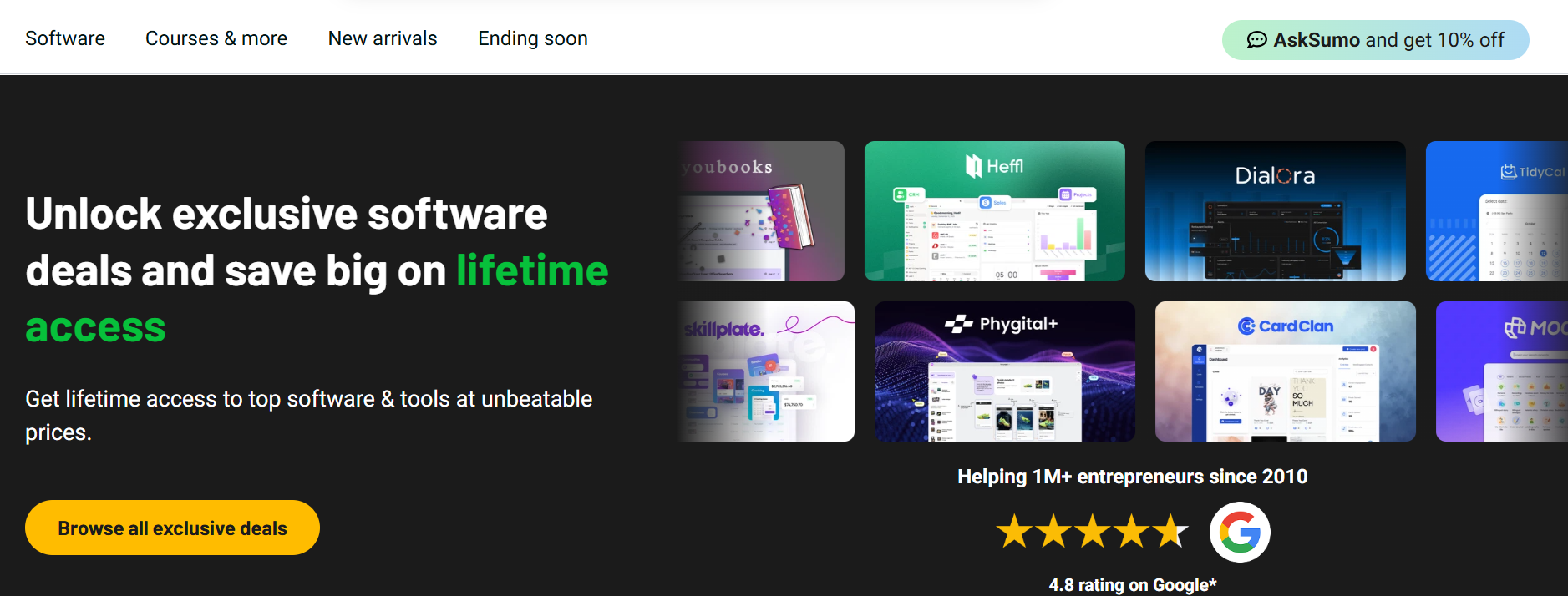


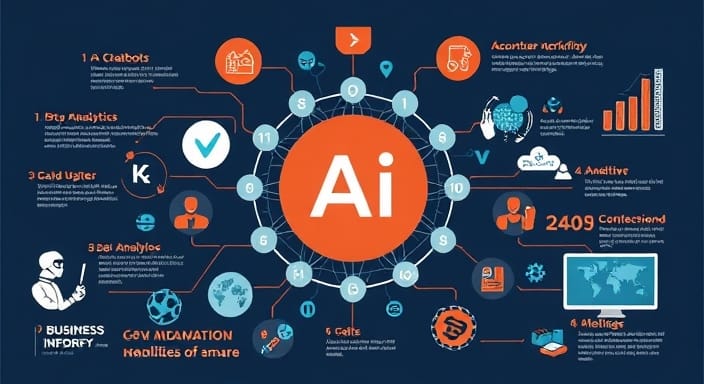


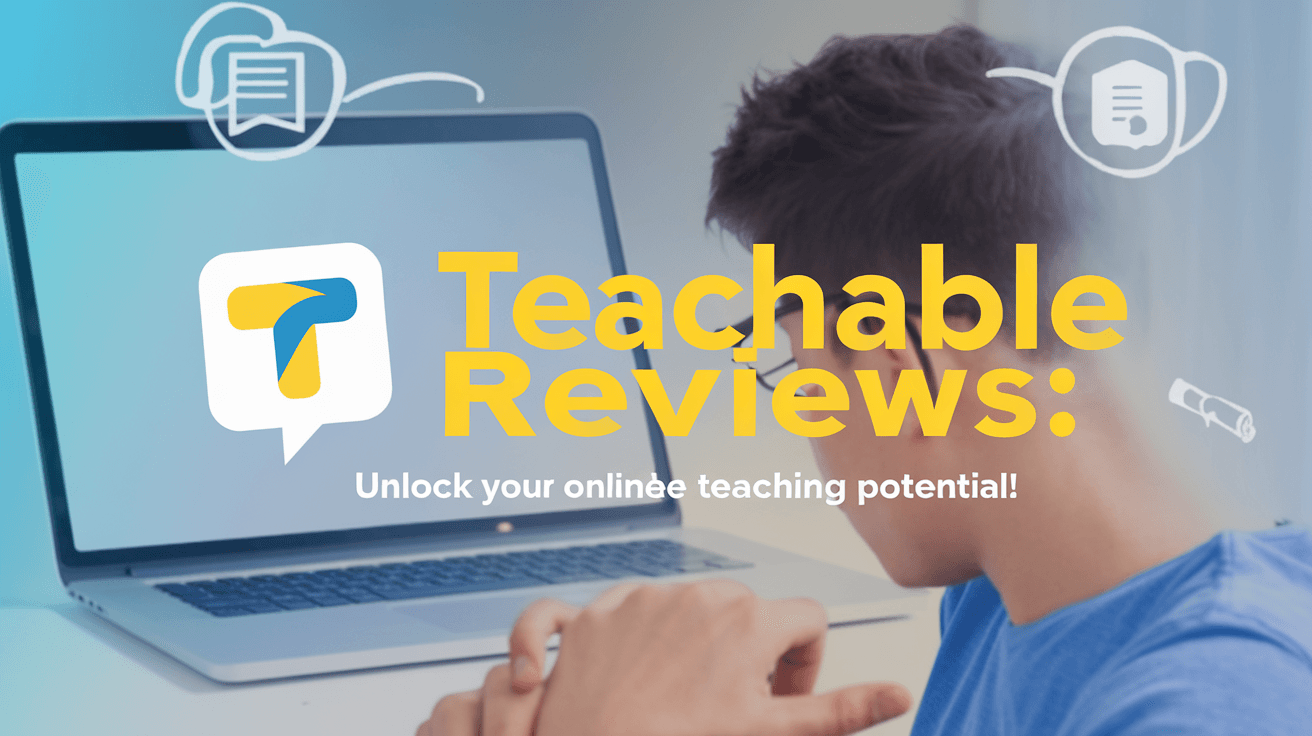

Comments
Leave a Comment
Your email address will not be published. Required fields are marked *